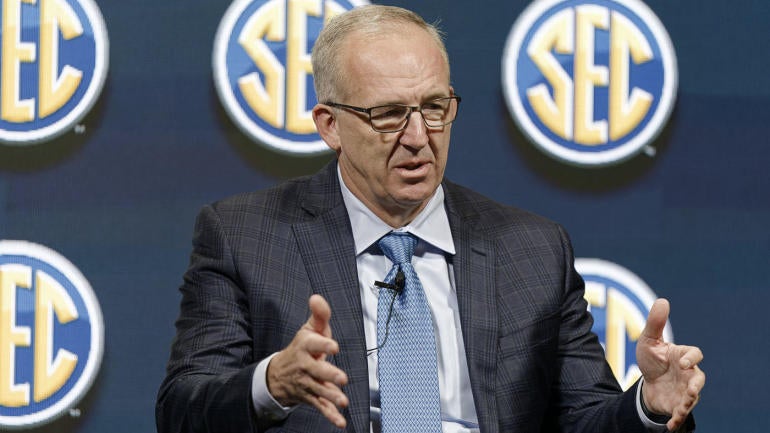
College football's early signing period already has at least one vocal opponent -- but it just so happens to be the most powerful voice in the sport. SEC commissioner Greg Sankey took time this weekend ahead of the College Football Playoff National Championship to address early signing period and its impact on the sport in a short amount of time. In short, Sankey believes the December signing period, coupled with the transfer portal, has made life more difficult for both coaches and players.
"We're crushing coaches in December," Sankey told The Athletic. "We're going to add playoff games (in December). We have to change early signing."
Sankey elaborated on the issue during a gathering with reporters on Sunday in Los Angeles, noting that with coaches voicing their concerns about the overload of activity in December, conferences "have a responsibility to take another look at it."
"From a remedy standpoint, I don't think you can go back to just the first Wednesday in February," Sankey said. "But you look at the alternatives. The fact that we have a national championship where we haven't had the extended dead period to which we are accustomed. Or even during the holidays because of the transfer portal. That's another weight on coaches. Coaches are saying, 'What are we doing?' We've had a lot of this input from the coaches."
If Sankey is saying this publicly, he's not simply shooting from the hip. He's likely repeating what he's heard from SEC athletic directors and the football coaches who work for them, and it's hard to disagree with the assessment.
A lot has changed since the early signing period was implemented five years ago. There was no transfer portal, and players who did transfer had to sit out a year. Now, there are transfer windows and no penalties for player movement, which has led to schools firing coaches earlier than ever and scrambling to find replacements before the early signing period to keep their classes together. In turn, it has placed added pressure on players to secure spots by signing early, and the players are doing so without knowing entirely who their coaches will be or where they'll be on the depth chart, depending on transfers.
"It's not as convenient as saying 'We have to look at the whole calendar.' We do, but we also have to address specific elements that are very different than would have been a part of the coaching community two years ago," Sankey said Sunday.
Slowing everything down would be good for the coaches, players and the health of the sport overall. When the early signing period was put in place, it was a relief for coaches because they didn't have to keep recruiting kids through February when they'd already "committed." Now, however, coaches have to continue recruiting the players already on their roster year-round to keep them happy and out of the portal. As for players, the early signing period marked a relief to end the ceaseless texts from other coaches to see if there were any cracks in the commitment. However, with the portal existing, those texts have kept coming after players are already on campus and in classrooms.
Finally, the least important consideration, but a consideration nonetheless, is that moving things back would keep the sport in the news cycle for a longer period of time. The February signing day was a big television and news event. While there's still coverage of the December period, it gets lost in the glut of coaching changes, transfers and bowl games. College football could benefit from following the example set by the NFL and other professional leagues of spreading things out into late winter and early spring.





















